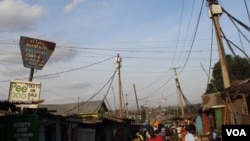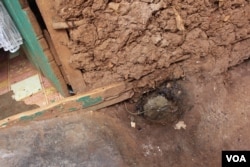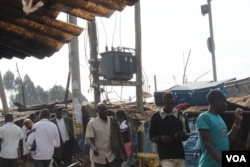Access to basic services remains a challenge for Kenya's fast-growing capital city, and in the informal settlements outside Nairobi, residents are risking their lives for access to cheap, illegal electricity.
Wires sprawl like webs over parts of Kibera. Some are repurposed telephone wires, balanced on wood and metal poles protruding from rooftops.
And they are dangerous. Reports of injury and house fires from live wires are common.
Resident Effie Akumu, 21, has seen two people killed by electrocution this month. She, herself, recently made her own narrow escape.
"I was in one of the neighborhoods here that I was not really familiar with. I had no shoes on, and my feet were wet,” she said. “I saw a flower and I wanted to go get the flower. By bad luck, I stepped on a live wire. I could not move. My sister ran to rescue me. She also got stuck with me. We started pulling ourselves away from the point. We managed to escape, but for some minutes my brain could not process what was going on."
Because electricity theft is illegal, people don't often report such cases to the police. While the dangers are well known, the practice persists.
A collection of live wires is strung delicately above George Juma's home.
"There is no way I can have an electric wire passing through my doorstep, and I do not have electricity,” he said. “Yet I know if I just connect another wire on the electric wire and cover it up with some soil, I will have electricity. Why can't I do my own connection? Put yourself in my shoes."
He says the power supply is tenuous, but he can't afford an electricity bill.
Cheap, safe alternatives
The Kenya Power and Lighting Company is working to decrease cases of theft.
"The solution is not to stop illegal connections,” said Kenya Power director Ben Chumo. “The solution is to offer alternatives cheaper and safe connections to Kibera people. We have given Kibera people electricity at the cost of $10 per month. There is no motivation whatsoever for anyone in Kibera to want to steal an illegal connection, because that illegal connection will be much higher in cost than the formal one that we are giving them. So what we are seeing in Kibera is the slowing down of those illegal connections."
The electricity program, funded in part by the World Bank and the Global Partnership on Output-Based Aid (GPOBA), has been in effect since 2014.
For every house that Kenya Power connects in Kibera, the World Bank checks the connection and reimburses the installation cost. The World Bank and Kenya Power also cover the difference between the residents' $10 monthly contribution and what the household actually uses.
This project has been rolled out across all informal settlements in Kenya.
Kenya Power says that, so far, about 60 percent of Kibera is legally connected. Residents call it "Stima ya tokens," referring to the 1,000 shilling tokens used to pay the monthly bills.















